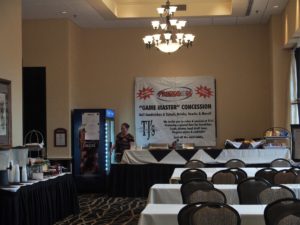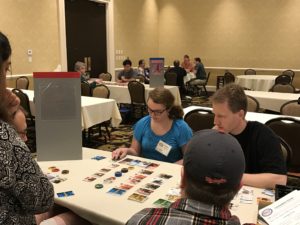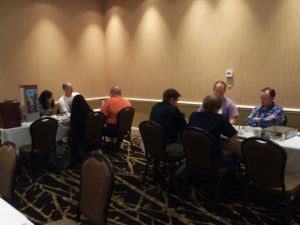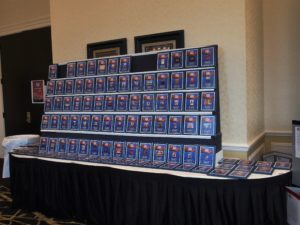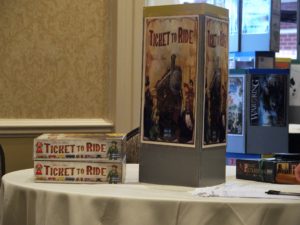GM: Allan Jiang
AGMs: Randy Buehler and Galen Loram
Tournament Format
- 26-31 participants: Top 13 in heat standings will advance to the semifinals where each semifinalist will play all others once. Top 5 in semifinal standings will advance to the finals where each finalist will play the others three times each.
- 32-47 participants: Top 16 in heat standings will advance to the semifinals where each semifinalist will play all others once, except those in their quartile (i.e. top 4 in heat standings will not play each other). Top 7 in semifinal standings will advance to the finals where each finalist will play the others twice each.
- 48+ participants: Top 20 in heat standings will advance to the semifinals where each semifinalist will play 12 different opponents; seeds 1-4 will not play each other, seeds 5-8 will face exactly one top 8 player in each game, and seeds 9-20 will face either one or two top 8 players in each game. Top 7 in semifinal standings will advance to the finals where each finalist will play the others twice each.
- Points in the semifinals (if applicable)
- Points in the heats (if applicable)
- Average % of winner’s score in current stage
- Head to head record in current stages, then in previous stage(s)
- Average points of opponents played in current stage (strength of schedule)
- Later average seat order in current stage, then in previous stage(s)
- Random
Resignation: Players may resign as their political action prior to age IV, by clicking on ‘Game Menu’, ‘Forfeit the Game’, and ‘More about resigning”. A player who resigns will place last among the players currently in a game, and will still earn tournament points accordingly.
Pace of Play: You are expected to check your games and take your turns (at least) once per day. It’s OK to have an occasional break of a couple of days, but we expect most games to finish in less than two months. Games that haven’t finished in 8 weeks are likely to be adjudicated, and the adjudication will include demoting slow players to lower finish positions.
Sportsmanship: Please be respectful to your opponents. Each player is entitled to make their own decisions in the game. However, it is not permitted to discuss pacts before offering them, to reveal any hidden information, or to intentionally help another player without any personal benefit in game. If you have any concerns, please contact the GM team.
Schedule
Registration Opens: June 13, 2021
Registration Closes: July 25, 2021
Heat Stage Starts: ~August 4, 2021
Results
Thirty-eight participants played 61 games in this year’s TTA PBEM tournament, which was run using CzechGames’s tournament interface for the first time. The CGE interface allowed for balanced seating in the latter rounds, automatic game creation, easy checks on tournament progress, and automated results into standings. Also new this year were a consistent format throughout all rounds (4 games each, weighted 10-6-3-1), a strict 16 players in the seeded semifinals, and new rules when players are replaced by bots.
In the heats, Mike Turian lead the way with three wins and a second, while Ryan Feathers, Jason Leggett, and Steve LeWinter each had two wins and two seconds and rounded out the top 4. Kevin Warrender set the high score with 375 culture, and finished the round with 23 tournament points, taking the 16th and final spot in the semifinals on tiebreaker over the GM, who managed to sabotage himself with all the new rules introduced in this year’s tournament.
In the semifinals, everyone faced all the other semifinalists except for those in their quartile in the heats standings. Steve LeWinter was the star of this semis, with three outright wins and a tie for 1st/2nd, and the high score of the round with 273 culture. Jason Leggett was just behind with three wins and a second. Joining them in the finals were Galen Loram, Randy Buehler, Eric Freeman, Michael Thiessen, and Mike Turian, who made it in with 20 tournament points plus tiebreaker over Sceadeau d’Tela.
Finals report by Galen:
The finals of the Through The Ages tournament featured a whole range of exciting games that somehow all turned out okay for me. In one of them, only knight tactics were played and despite desperate attempts to stay within strength range, aggression after aggression landed. I finally was lucky enough to give up my sovereignty to Randy and be a bit sheltered from attacks and safe from wars; Watt flipped an early oil which let me build up which, when combined with a Mech ag, let me stabilize and grab wonders while not being part of the wars flying left and right, and sneak out a win. Another one featured a random early printing press and Jan Zizka to get a nice culture lead early and endure some abuse later on; Mike and I had symbiotic civilizations and a big enough culture gap between us that our impacts together took him from fourth to third and me from second to first. One other game featured a nice military and Jason realizing that I was in the driver’s seat, and that playing for second was his best play – sending a military alliance my way to direct my hostilities other ways. The other game was just a “first seat doing first seat” things – the built in advantage of going first was enough to make the game go reasonably smoothly.
The CGE tournament system was a huge boon. We could see where we were relative to other games in terms of progress and everyone in the last game was sweet enough to speed up play in order to ensure that we could finish the tournament on time. Beyond that, having seat order balanced and a bit of seeding in the semis based on the heats was really great – definitely things that I hope to see in the future! Thanks to all the participants and organizer for a great tournament, and I hope to give defending my crown for a three-peat next year a try!
Congratulations to Galen Loram for winning both of his first two BPA TTA tournaments! Will anyone be able to challenge him? Next tournament will start in spring 2022.
The final standings were:
- Galen Loram
- Michael Thiessen
- Michael Turian
- Steven LeWinter
- Jason Leggett
- Eric Freeman
 I arrived Monday evening and the Doubletree shuttle picked me up at the train station. It ended up being too late to pick up my badge, but I was able to catch up with some friends.
I arrived Monday evening and the Doubletree shuttle picked me up at the train station. It ended up being too late to pick up my badge, but I was able to catch up with some friends.